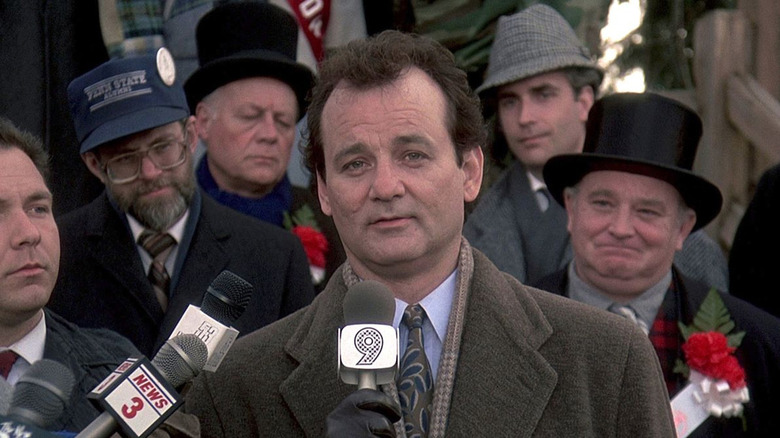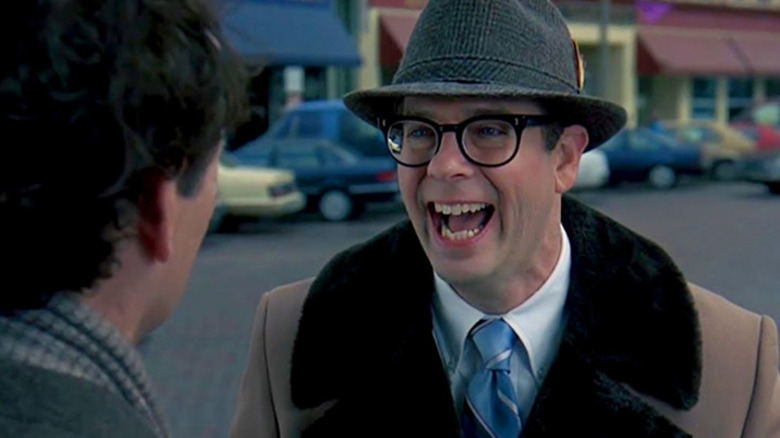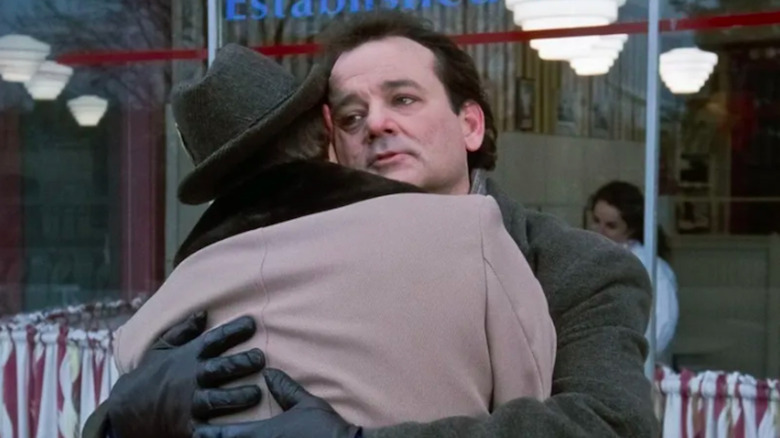Groundhog Day Was Painstakingly Planned, Except For One Improvised Scene
There's an assumption, especially nowadays in the post-Judd Apatow filmmaking era, that comedies are great big improv fests. A finished script is nice and all, but when you put a bunch of funny people together, you'd be loath not to let them riff up a storm; give yourself a multitude of options in the edit, and, provided your cast brings their A game, you'll wind up finding the funniest possible version of your movie. It's comedy Cassavetes!
This is, of course, nonsense. While great actors are capable of improving a scene via a sudden bolt of inspiration — be it dramatic or comedic — you don't waltz into a production with a bare template in the hopes that your cast will deliver inspired daily punch-ups. You plan the living hell out of your movie because you've got to make days; falling behind schedule means going over budget, and unless you're Steven Spielberg making "Jaws" (and even then!), this typically portends trouble.
Still, some people assume that certain comedy legends are the chaotic authors of their films' finest moments because they received top-flight improv training or came out of stand-up. Richard Pryor, Lily Tomlin, and Eddie Murphy seem to have endless reservoirs of creativity — and, well, they do. But they work within the strict parameters of the screenplay and pick their spots. Take Bill Murray, for instance. Get him in front of a camera, and he's going to be brilliant. But even this infamously unruly performer sticks to the script. This was especially true during the shoot of "Groundhog Day," where the comedy grows out of weatherman Phil Connors' exasperation in the face of unceasing repetition. Murray had to play the role as written.
Most of the time. There was at least one exception.
Ned Ryerson, the insurance salesman from hell
During a "Groundhog Day" Q&A at the 2023 Turner Classic Film Festival, Stephen Tobolowsky told moderator Ben Mankiewicz that Murray stuck to the script in just about every one of their scenes where Tobolowsky's insurance salesman, and former acquaintance of Connors', Ned Ryerson gratingly strikes up a conversation with the misanthropic TV personality. Their first interaction ends with an annoyed Connors stepping off the sidewalk into a puddle.
According to Tobolowsky (who recorded an excellent, long-running podcast for /Film), the only unresolved element of the scene while they were shooting was the weather. Would it be a sunny day, a snowy day, or somewhere in between? Given that they shot the film in Chicago in March, one day might be spring-like and another might be a wintry, windy hellhole.
They shot in all kinds of conditions, but director Harold Ramis ultimately decided that Connors' unending February 2nd should be a gloomy day, which matched his protagonists' mood. And it was on one of those gloomy days that Murray opted to surprise Tobolowsky with a most unexpected gesture.
'I think there were dirty tricks involved'
The scene began like any other. Ned spies Phil across the street and rushes over to greet him. This time, Murray pulled a 180. As Tobolowsky told Mankiewicz:
"I think there were dirty tricks involved. It's the scene where Bill hugs me on the street. That was not in the script. Where, 'Ned, are you busy later?' That was all made up. And Harold Ramis had cameras — maybe Harold knew about it, but I had no idea. And so he had the cameras set up, and we did it in one take, and Harold Ramis said, 'I think we have that.'"
To his credit, Tobolowsky met Murray's reversal with one of his own. When Murray refuses to break his embrace, Tobolowsky squirms out of his clutches and says he has to be going, at which point he runs away. It's a deftly played moment, one that gets paid off when, on Phil's final day in limbo, we learn he bought loads of insurance from Ned.
Murray might've made other off-the-cuff additions in other scenes with other actors, but this is a reminder that even a seasoned, extremely confident, occasionally surly comedic maestro knows to trust the material as written. In doing so, he wound up starring in one of the greatest comedies ever made.


